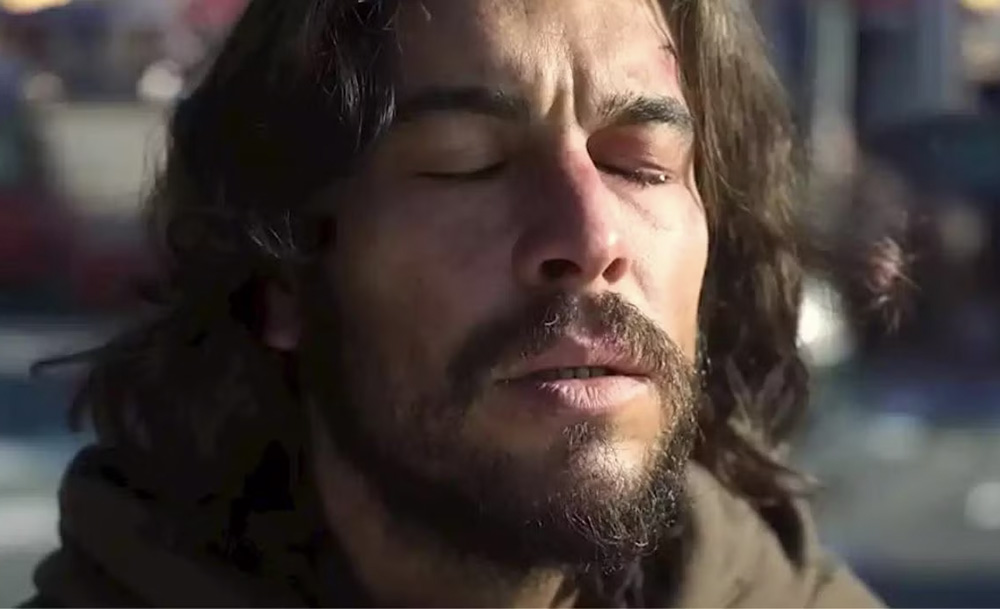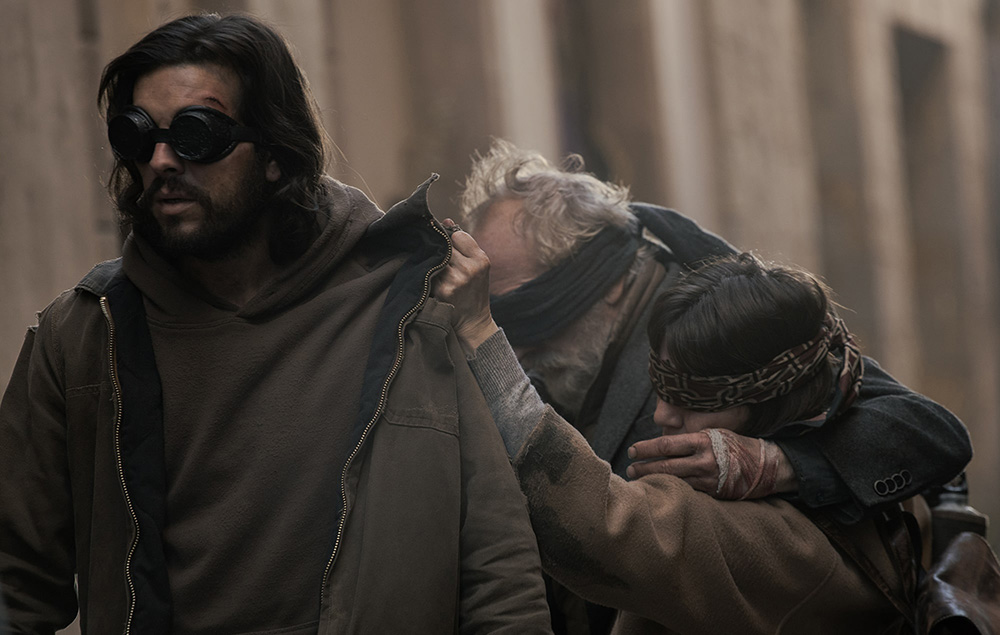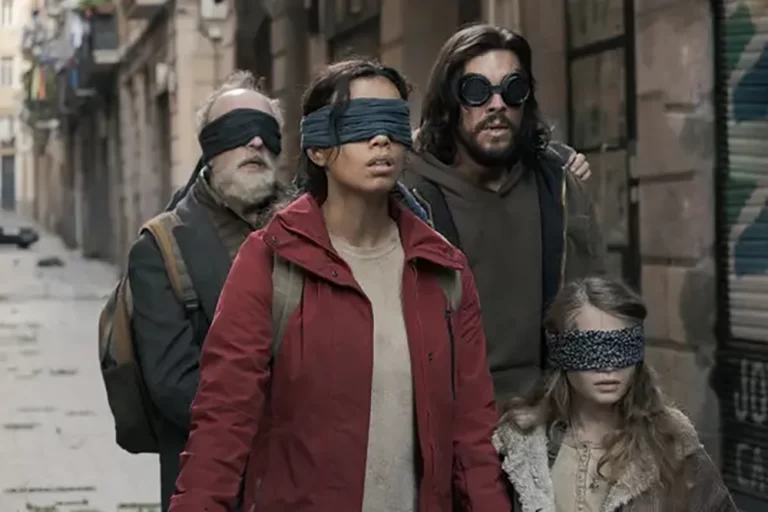“Bird Box: Barcelona” is different. It works for several reasons. First, watching “Bird Box” (2018) is not a pre-requisite for this film, but doesn’t hurt. That film—starring Sandra Bullock and two nameless children—was a survival story full of drama. “Barcelona,” by default, is mostly absent of drama, though it has introspection and action. It focuses on a a man named Sebastián (Mario Casas) and his daughter (Alejandra Howard), navigating a post-apocalyptic Barcelona taken over by the creatures from “Bird Box.” They hunt by sight, for those who may have missed this film’s predecessor. If you look at them, you die. “Barcelona” follows these same rules. If you see the invisible beings, you become overrun with the urge to kill yourself. But some hosts do not. Some become insane but do not commit suicide. They make it their mission to show others the “miracle,” unaware it will mean their doom.
“Bird Box” touched on this slightly, but never introduced these people as anything more than villains to be avoided. This film is two years old and I’m going to attempt what may be a spoiler. But it’s impossible not to, as it’s the main reason this film is different and the reason why it works. Sebastián is one of these crazy people. He has seen the creatures, become possessed by them, and wants to show others the miracle. That the film uses Sebastián as the driving vehicle of the film sets it apart, and garners—somehow—empathy for him along the way.
Trumps ‘Bird Box’ in Uniqueness
It helps that “Bird Box: Barcelona” has more imperative than the original. It’s co-directed and co-written by David Pastor and Àlex Pastor, whereas “Bird Box” was written and directed by different folks. That film also came out in close proximity to “A Quiet Place” (with “The Silence” not far behind), and the field of sense-hunting creatures and survival was supersaturated. But here, five years after “Bird Box,” we find a film more stripped down to its nuance. It’s a Netflix Original, yet is subtitled, recorded in Spanish throughout. This immerses you in the proceedings more. You feel lost in a foreign land amidst foreign creatures. Fear radiates more than language anyway. Barcelona looks destroyed. This is also a departure, as in “Bird Box,” the event has just transpired. Here it looks more like New York in “I Am Legend” than the romantic city it once was.
It was also an interesting move to make Casas the main character… especially as we see him basically murder people throughout the film’s first half. Murder may not be the right word: he opens their eyes to the “angels.” While we never believe they are really angels (one who has seen cuts his throat open with a piece of glass; another basically decapitates himself plunging his head through a car window), we believe that Sebastián believes they are. In this way it shares notes with the underrated and perfect “Fraility” and Bill Paxton’s insane belief that causes most of the film’s horror.
“Bird Box: Barcelona” follows its logic well. It took me until the halfway point to stop loathing Sebastián, realizing he wasn’t evil—he was possessed. We’ve seen the group of religious zealots that first opened his eyes, who now hunt survivors to “liberate” them as well. I found this authentic. In a post-apocalyptic world, religious hysteria would doubtless take over. And while these people are lost—the creatures’ captives, really—you could see a scenario where they do it willingly were this to really happen.
Mario Casas is Tasked with a Hard Sell

The film builds its tension by letting us know Sebastián’s true motives, where the others he meets (the film boasts a stacked cast) are unaware. Some become suspicious of his answers—he’s learning to lie, but he’s not really that good at it. And the whole time, his angelic daughter Anna speaks to him, consoling him, letting him know he’s not a bad person. More really can’t be said without profound spoilers. But the filmmakers wisely juxtaposes Anna with another young child Sebastián meets, Sofia (Naila Schuberth), who moves the story in emotional ways.
The film’s SFX are solid, reminiscent of the original, but trying to be less ambitious instead of more. The creatures are invisible, but slight disturbances in the various protagonists’ field of vision—mostly leaves blowing in the wind and light bending reminding one of “Predator”–alerts us to their presence. Likewise when a creature infects someone, their eyes turn this otherworldly pallor. But where the “Bird Box” series separates itself from zombie films, the possessed don’t look ‘dead.” They look pained, for a moment, and then end themselves horribly. We feel for them, when I can’t ever remember feeling for humans turned zombies in a film, except maybe the excellent James Badge Dale in “World War Z.”
Improves Upon ‘Bird Box’

“Bird Box: Barcelona” isn’t perfect. It relies somewhat on previous knowledge of the story, yet it’s unlikely many would venture into this film without having seen the first. It subtracts the drama and theatrics—this is a group trying to survive, and there’s very little in-fighting. Sebastián answers for this by deceiving them throughout. However, the film offers a unique thought: that even those possessed and assumed ‘dead’ can come back, and the film’s end—involving gangs of the insane, explosions, and gondola towers—has more surprises than you would expect from a film like this.
In this way, “Barcelona” separates itself from the legion of invading creature films that have come before. It aligns us with an unlikely person, and Casas portrays the part well. Little hope exists in this world, but Àlex Pastor and David Pastor make it seem possible. The film’s end is its only real defect. Inserting science and military into films like this only does it a disservice (see “The Blob,” 1988). But humans are imperfect and the renderings are believable. It dents the climax’s emotion but doesn’t erase it. All-in-all I liked this film. It improves upon “Bird Box” and revisits this crazy world. A solid Halfway to Halloween option.



